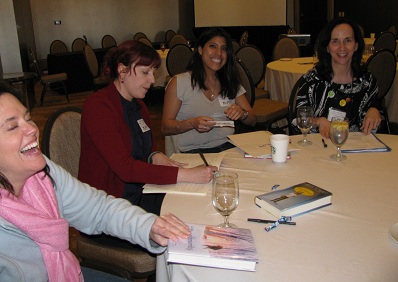I’m awfully behind on posting notes from conferences. And there’s definitely added value if I share what I’ve learned. So – I’ve decided to attempt a weekly feature – Conference Corner – to share what I’ve learned at conferences. It will be awhile before I catch up, especially since I’m going to ALA Annual Conference next month, and I still haven’t finished talking about the Morris Seminar, ALA Midwinter Meeting, and PLA Biennial Conference.
One of the highlights of the Morris Seminar, a one-day seminar offered by ALSC to train people to be on book evaluation committees, was when we got into groups and practiced what we’d learned with books we’d read ahead of time. Here’s a picture of part of the group I was with. You can at least tell we were all having fun!
After lunch, we listened to a Panel Discussion featuring past committee chairs from some different ALSC Award committees: Martha Walker, from the Pura Belpre committee; Julie Roach, from the Geisel committee; Mary Burkey, from the Odyssey committee; Rita Auerbach, from the Caldecott committee; and Cyndi Richey, from the Newbery committee.
I took down some rather haphazard notes about the different committees. Below are some of the things they said.
Geisel: You’re evaluating text and pictures together. The illustrations need to work for someone just learning to read. One committee member adopted a classroom to try out the books.
Notable Committees: These are open committee meetings. Everyone’s equal when you walk through the door. You can learn about book evaluation by listening to these committees.
Audiobook evaluation: Assume the book is good. Now look at the narrator and the story. You’re evaluating production quality.
Here are some things to consider about the narrator of an audiobook:
Was the narrator authentic and genuine to time, character, etc?
Does meaning come through?
Is voice consistent?
Are accents correct?
“He said” “she said” should be dropped.
Don’t want a “fake voice.” You shouldn’t perceive that someone’s reading into a microphone.
Also think about the production quality. Don’t let a story you love blind you to the way it’s carried out.
Recommended book: Listening to Learn: Audiobooks Supporting Literacy, by Sharon Grover.
I took lots of notes about the Caldecott committee:
Rita Auerbach said she had less influence when she was the chair than when she was a regular committee member.
The function of the chair is to keep things going smoothly.
To be a good Caldecott committee member:
Participate in the discussion.
Read and respond on time.
Respect other members and couch concerns as questions.
Be willing to be cut off.
Don’t make up your mind in advance.
You can have an opinion, but at least be open to making your opinion change.
Picture books are difficult to discuss. Cultivate the vocabulary for talking about art.
Believe that artists, like authors, make decisions.
Think about the impact.
When discussing, don’t go through the book page by page. Use post-its to mark what you want to talk about.
Remember: There is room for interpretation.
“Most distinguished American picture book” does not necessarily have the most distinguished art.
How to prepare:
Read the books suggested in the manual, such as Picture This: How Pictures Work, by Molly Bang, and Show and Tell: Exploring the Fine Art of Children’s Book Illustration, by Dilys Evans
Your basic premise is that the illustrator has done everything deliberately. How does it impact the book?
What do you see? How does it make you feel?
You can consider text, design, and everything else that goes into the book.
Notes about the Newbery Committee:
Being on the committee builds mutual respect and trust between the members.
Look at the role models in your life and seek out opinions.
You will not remember what you read. Definitely take notes!
Best advice: Keep an open mind.
You’ll look at Suggestions and Nominations.
“Read while you eat. That’s called ‘reating.’”
This will be your most professionally satisfying experience because everyone’s read the same books.
To get prepared, attend a Notable Books discussion.
You can’t even have an appearance of a breach of confidentiality or conflict of interest.
Be on the lookout for other critical discussions. (This is why I’ve joined Capitol Choices.)
This is a literary award for literature for a child audience.
Recommended: Books by Lee Gutkind on creative nonfiction, From Cover to Cover, by K. T. Horning
It’s so important to listen! And listen without frowning.
Being in a committee will help you to use and hone your skills. You’ll use them for a lifetime.
